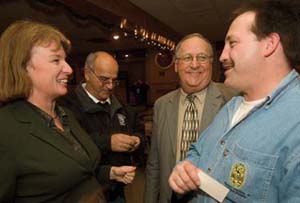 |
 |
| current issue |  |
past issues |  |
send a letter/news |  |
address update |  |
advertise |  |
about us |  |
alumni home |
Features
The Unexpected CongresswomanPage 2 of 5
Yet on the evening of Nov. 7, when the last ballots were counted and Bradley had conceded to Shea-Porter, who had won the seat by less than three percentage points, the Shea-Porter celebrants at the Frank Jones Center in Portsmouth harbored a different theory. As they cried and hugged and pumped their fists in the air, Shea-Porter's supporters would have argued that beyond Bush-backlash, beyond Lynch's coattails, the real reason their candidate won was because she is, quite simply, exceptional.

|
Shea-Porter wasn't shocked because, she says, she had her ear to the ground and "could hear the volcano rumbling." And because she had refused to let others define the rules by which she played.
It is a cold December morning in a Rochester restaurant, not far from Shea-Porter's home. During the campaign, Shea-Porter and French and other members of the inner circle would come here to strategize over coffee and pastries at the seating by the window. "That's our table," says French, proudly pointing. Her job today, as it was during the campaign, is to make sure that Shea-Porter makes all of her appointments. On time. But French, gray-haired and good-natured, just two months shy of turning 65, won't elaborate. Shea-Porter is, after all, one of her best friends.
Shea-Porter, scrubbed and fresh in black fleece, smiles wryly. More earthy than polished, the 54-year-old congresswoman-elect is makeup free and relaxed. Even when campaigning, she had a practical aura, a woman who preferred sensible flats over heels and turtlenecks over Armani. She is, as her friends say, comfortable in her own skin. When a volunteer once told her that too many trips to the hairdresser would ruin her homespun image, she laughed. On the occasions when she was inspired to upgrade her wardrobe, she found herself more interested in hearing the sales clerk's life story than trying on suits.
She was, she says, a reluctant candidate. She had no intention of running against Jeb Bradley, whom she had confronted for years at his town hall meetings with constituents. Although she disagreed mightily with him on almost everything, from Iraq to privatizing Social Security to raising the federal minimum wage, she didn't want to put herself or her family through a campaign. Her children were getting older--her daughter was in college and her son in high school--and her husband Gene was supportive, but the prospect of media intrusion and all that time away made her shake her head whenever her lunch group, a cluster of women she had met while working on presidential campaigns for Wesley Clark and, later, John Kerry, suggested that she consider a run.

|
Instead, she prodded others at the table. Sue Mayer had attended almost as many of Bradley's town halls as Shea-Porter. But Mayer didn't think that her years of teaching and graduate work in 15th-century German history and the nearly two decades she had lived in Canada provided the necessary credentials. Caroline French had always been political--when her husband died suddenly in 2004 during his campaign for state representative, she and her family requested that friends honor his memory by voting for John Kerry for president--but she wasn't interested. She preferred to help other campaigns, which left her time for her antique jewelry business.
Attention would always return to Shea-Porter. She knew Bradley's record better than anyone, and her family had deep New Hampshire roots. Most important, Mayer says, "She's quick on her feet." She knew how to use stories and metaphors to explain complicated subjects, and she understood the issues.
Still, it wasn't until Shea-Porter spent more than a month volunteering at Louisiana shelters in the wake of Hurricane Katrina that she changed her mind. She found the scene deeply unnerving--the despair, the chaos, the destruction, the death, the crushing number of people seeking shelter and support. "Where is the government?" she remembers thinking. "There is no place for these people to turn."
When she returned to New Hampshire, she announced that she would run. She felt as if she had been in the front yard talking about the issues, while the real dialogue was in the living room. "If I were elected," she thought, "I could move inside." She asked Mayer to be her campaign manager.
"I've never run a campaign before," said Mayer.
"I've never run for office before," replied Shea-Porter.
Page: < Prev 1 2 3 4 5 Next >Easy to print version

